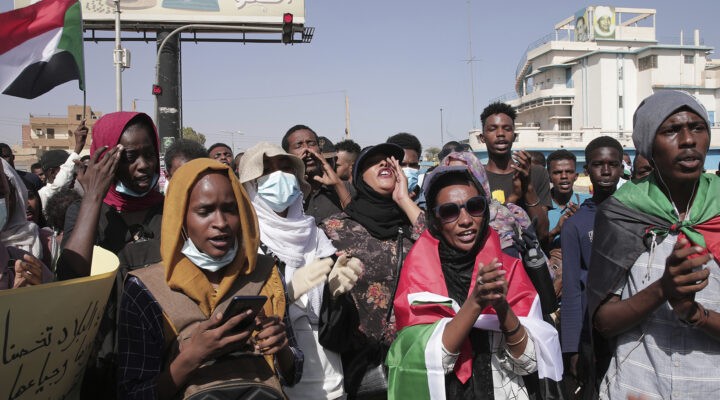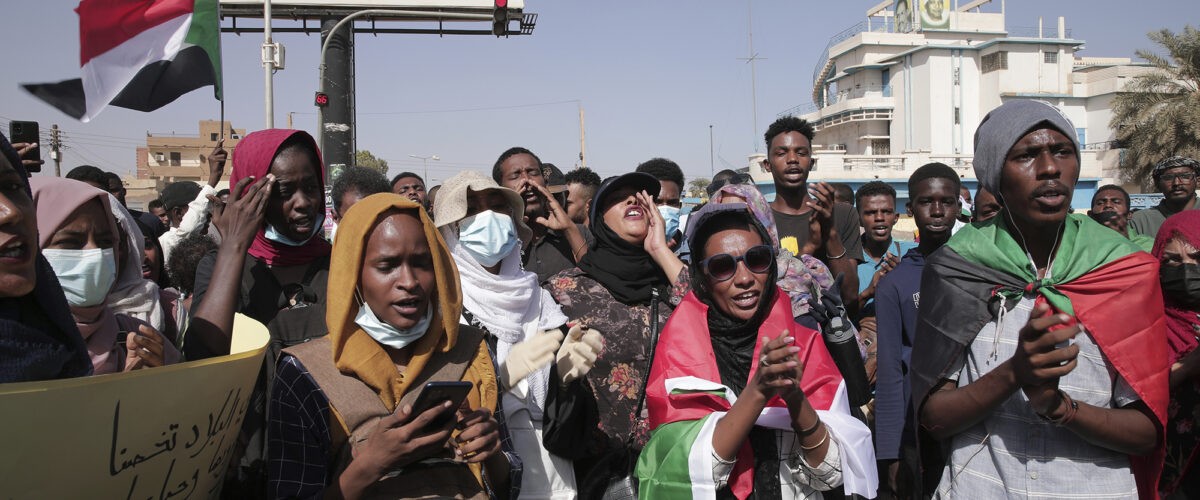In what may feel like a repeat of last year, large parts of Africa kicked off 2022 facing violence, political unrest, poverty and hunger.
Demonstrations in Sudan and a crackdown on protesters by security forces made headlines in local and international mediums. That crisis — a protest against the military coup that happened in the country last year — has as at the last count claimed 57 lives, according to the Sudanese Central Doctors Committee.
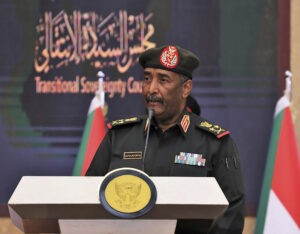
In this photo provided by the Sudan Transitional Sovereign Council, Sudan’s top general Abdel Fattah Al-Burhan speaks during a ceremony to reinstate Prime Minister Abdalla Hamdok, who was deposed in a coup last month, in Khartoum, Sudan, Sunday Nov. 21, 2021. (Sudan Transitional Sovereign Council via AP)
The unrest, which led to the Jan. 2 resignation of the country’s prime minister, Abdalla Hamdok, was for some observers a reminder of the seemingly unsurmountable challenges some African countries currently live with.
While Sudan’s current troubles were triggered by a military takeover, the source of despair is different in other countries on the continent. For example, in Ethiopia fighting between rebel forces of the Tigray People’s Liberation Front (known as TPLF) and government forces has left thousands of people dead since November 2020 and created one of the worst humanitarian crises in the world, with famine, hunger and forced displacement of people as features of the conflict. That war began when the TPLF wanted to secede from the country.
Meanwhile, in Nigeria, insurgent groups like Boko Haram continue to wreak havoc, killing and maiming people while targeting them for their religious beliefs. This is a recurring problem particularly in the middle belt and northern parts of the country.
Generally, across the African continent, problems associated with poverty and unemployment have caused untold hardships for many, causing those who can escape to seek greener pastures elsewhere. This also is a driver of the great global migration currently underway.
According to the United Nations, more than 700 million people, or 10% of the world’s population, still live in extreme poverty today, “struggling to fulfil the most basic needs like health, education and access to water and sanitation.”
In sub-Saharan Africa, the majority of people live on less than $1.90 a day.
After colonialism
While not peculiar to Africa, the continent has faced many challenges in its years of independence from colonialism. Opinions are divided as to why Africa, a naturally endowed continent, is perennially beset with such challenges.
Some analysts blame it on the colonial systems that, as in the case of Nigeria, forced disparate tribes into one union state without regard for historic or ethnic identities.
Others link the challenges to the quality of leadership on the continent in the postcolonial years. According to this view, Africans have piloted their countries’ affairs long enough since independence to blame no one but themselves for their problems. In this regard, it does not help that many of those who found themselves in leadership after colonialism choose never to relinquish power.

Claire Felter
“Some postcolonial leaders in the 1960s and 1970s sought to become ‘president for life,’ with several managing to remain in power for three or more terms,” noted Claire Felter, writing for the Council on Foreign Relations. She identifies sub-Saharan Africa as home to many of the world’s longest-ruling dictators and leaders.
“By the turn of the 21st century, the trend of entrenched leadership had spread across the region, spurring corruption, instability, societal fractures, and economic stagnation,” she said. “Leaders who gained recognition during national movements for independence consolidated power and bound their own positions in office with their countries’ national identities.”
For example, in 2021, she reported: “Five sitting African heads of state had been in power for more than three decades each: Teodoro Obiang Nguema Mbasogo in Equatorial Guinea, Paul Biya in Cameroon, Denis Sassou Nguesso in the Republic of Congo, Yoweri Museveni in Uganda, and Isaias Afwerki in Eritrea. More than half a dozen other African heads of state have been in power for at least ten years.”
Her interpretation: “Strong correlations exist between sub-Saharan Africa’s entrenched leadership and its developmental and security challenges, including conflict or instability, stagnant or declining economies, and democratic backsliding.”
According to the Economist Intelligence Unit’s 2020 Democracy Index, “two dozen countries in sub-Saharan Africa have authoritarian governments. Rights abuses in the countries with the longest-serving leaders have included secret or arbitrary arrests and detentions, tight restrictions on freedom of expression, and police brutality, according to monitoring groups.”
An African man on a mission
One African who saw firsthand the effect of conflict on the African continent is Emamsy Mbossa.
Drawing from his experience as a child in Republic of Congo, Mbossa — now a Columbia University graduate and founder of Conflict Insider, an organization that focuses on training, prevention and mitigation of conflict — regrets that the narrative for many African countries has remained pretty much the same.
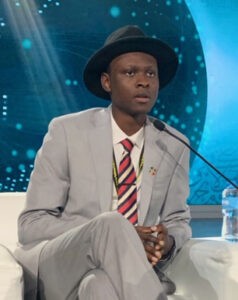
Emamsy Mbossa
“It’s a bitter observation to see the African sociopolitical context, impeded by instability and violence,” he explained. “As an African, I have seen and experienced it during my childhood back in 1997 when a civil war erupted in the Republic of Congo. I was only 4 back then. I thought maybe this could end one day. But today after 25 years, nothing has changed much.
“It’s an alarming situation. My feelings remain the same as when I was a child. I feel with all these boys and girls who can’t even have a chance to dream, because they’re trapped in this infinite loop of atrocities. The truth is, we just want it to stop.”
Yet, he added: “Africans are resilient; we have been through a lot; yet we survived. Now is the time to create a new image for Africa going forward.”
He believes poor governance is to blame for the continent’s woes: “Bad governance doesn’t only slow down development, it is the main source of conflicts in the continent. It’s true, there is (a deficiency) of quality leadership in Africa, especially when it comes to handling conflict without the use of violence.
“However, that is not the only root of conflict. We can also add numerous causes such as the lack of accountability, the use of public institutions for personal gains. Legitimacy is also identified as a key factor for unrest and violence in many African countries, where powers face multiple popular (resistance). Communities are excluded from the decision-making process, and therefore they feel marginalized and underrepresented, increasing the likelihood of civil war and violence.”
The lack of an inclusive growth strategy in sub-Saharan Africa, he said, has helped create the extremist groups that terrorize people today.
An ambassador’s perspective
Not every African country is plagued by instability or war, however. John Campbell, a Ralph Bunche Senior Fellow for Africa Policy Studies with the Council on Foreign Relations, points out that “South Africa is a functional democracy characterized by the rule of law. So is Botswana. They are very different from places like Eastern Congo or Ethiopia.”
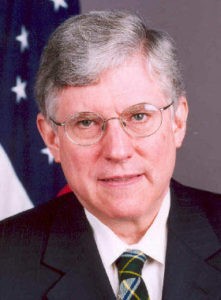
John Campbell
Campbell, who served as U.S. ambassador to Nigeria from 2004 to 2007, traced that country’s problems, too, to leadership.
“In my view, the crisis of Nigeria revolves around poor governance at essentially every level of government. And there’s nothing new about this. It’s been true pretty much ever since the coups that destroyed the first republic (in the 1960s). That is to say the governance has been captured by self-interested elites that show very little interest in the welfare of people they are (supposed) to govern,” Campbell said.
“I will overlay that with the resurgence of ethnic identity that also promotes the fractionalizing of the state, and I would also add increased competition between Islam and Christianity. The unpleasant reality is that jihadi movements in the north, some of them have contacts with jihadi movements elsewhere but they are primarily of domestic origin and they reflect the breakdown of governance.”
Naturally, “the elites that are entrenched are normally highly reluctant to give up their power and they will do so only when they see it as in their own self-interest to do so,” he added. “Right now, Nigeria’s various elites are able to avoid many of the consequences of poor governance that affect most Nigerians. We all know of Nigerian elites going to London or Johannesburg for medical attention or sending their children abroad to be educated. We all know about Nigerian elites who have second homes in Johannesburg or London or New York or Los Angeles. So, they are largely immune, at least up until now, from the crisis that impacts most Nigerians.”
And that leads to one reason why the spate of kidnappings in the country has attracted so much attention, he explained. “Because kidnapping does affect Nigerian elites and is one reason why I think they have become so afraid.”
No single solution
What can be done to address or reduce the level of challenges many African countries face? Like the complex nature of the continent, there is no one single solution for problems, but some country-specific ideas are offered.
“I would fall back on what President Obama said in his speech in Ghana and that is that what Africa needs is strong institutions, not strong leaders,” Campbell said. “We have seen in Africa, I think, over the past year, a definite recession away from democracy and the rule of law, and that is not so good.”
“We have seen in Africa, I think, over the past year, a definite recession away from democracy and the rule of law, and that is not so good.”
Mbossa agrees. “Living a conflict-free life in Africa will require more actions than just mere slogans. We need to tackle root causes and address the needs of communities that are the most affected by conflicts.”
To that extent, Obama’s view that “Africa doesn’t need strongmen (but) strong institutions “makes sense,” he said.
“We need to protect state institutions from being manipulated, constitutions from being tinkered. The justice system needs to remain neutral to effectively ensure accountability, the respect of human rights, good governance, responsive institutions that people can interact with, including a framework for the protection of stability through law and order, so people can go about their daily lives and achieve their dreams and aspirations.”
Creating this kind of lasting peace and security on the continent “will require the participation of the entire community to consolidate peace,” Mbossa suggested. ‘Knowing that we are a very diverse continent with multiple ethnicities, diversity should be our strength. Discrimination amongst us based on ethnicity or religion should stop. Tolerance is a crucial step in strengthening peace.”
He also advised civil society groups to play their part as watchdogs. “In a nutshell, what’s happening in Africa since independence is a shared responsibility between the civil society and political authorities. Weak civic engagement from the youth and local civil society organizations has a deep impact on peace and stability.”
Investing in people more than militaries
Stephen Chan, a professor of world politics in the School of Oriental and African Studies at the University of London, also sees the need to invest in development more than militaries.
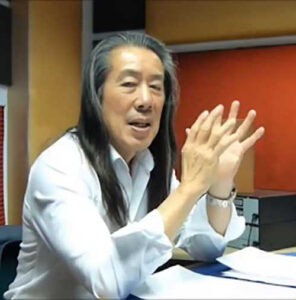
Stephen Chan
“Increasing the levels of provision and funding for development, especially in education and health, yields more results than increasing funding for policing and military capacity,” he said. “People rebel because of an absence of development. This absence is felt even more strongly if funding has been corruptly stolen.
“The battle for citizen loyalty always starts with provision and with honesty, with fairness and without discrimination,” Chan said. “Having said that, when military action is unavoidable, it has to be proportionate but, above all, it must be skillful. When soldiers cause more damage than terrorists, especially to women, conflicts and rebellions will continue. It seems an odd thing to say, but having more female commanders might lessen the terrors of indiscriminate civilian casualties and gendercide.”
And again, what armies need is not always more equipment but better, more-precise strategies, he said. “Educated commanders, whether male or female, are essential.” Yet across Africa, “too many sons of presidents seem to be generals. That is not a qualification to be a general. It is not even a qualification to be a second lieutenant.”
On what it could take to effectively tackle the religious crisis, Chan said, “As for religious violence — (such as an Islamic jihadist uprising) — it would be a mark of public sensitivity to appoint a field commander who was himself or herself Islamic, so that there is a reaching out before raining missiles down.”
Anthony Akaeze is a Nigerian-born freelance journalist who currently lives in Houston. He covers Africa for BNG.
Related articles:
In South Africa, an unholy trinity — televangelists, TV stations and cellular companies
In Africa, the challenge is not just low vaccine numbers, there’s also vaccine hesitancy
Climate change is heating up the terrorist conflict in Africa’s Sahel region

